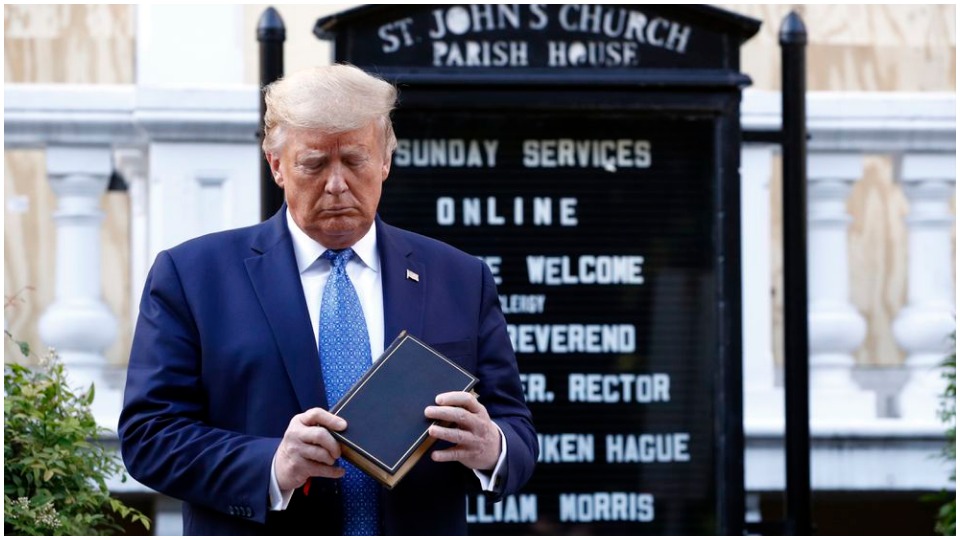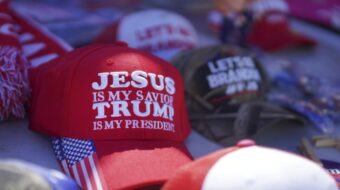
Desecration of a cherished symbol and a holy place? Far greater sins occurred behind the scenes! Crowds in Lafayette Park dispersed without warning by tear gas and a painful hail of “less-lethal” bullets, no doubt aimed at faces and eyes. Ahead of the much publicized photo op, a parish priest forcibly removed from the premises.
The photo stands to mark captured territory—entered without permission—on which the conquerer stakes his claim as if prefiguring the placement of a historical marker upon the site: “At this place on Monday, June 1, 2020, President Donald J. Trump stood….” Smiling, he holds a Bible high as a symbol of victory over the peaceful protest, not as a symbol of what is transcendent and holy but as a prize of worldly conquest.
The bishop of the Episcopal Diocese of Washington expressed her outrage: “The president just used a Bible and a church of my diocese as a backdrop for a message antithetical to the teachings of Jesus and everything that our church stands for.” Yes, antithetical. A backdrop was being primed for a plan to end the outcry over lives utterly devalued by a society whose concerns are measured monetarily and in terms of property. Only a short time before the photo op, Trump used the Bible to put forth a program of forcible “law and order,” a program in which he called the protests “a sin against God.”
No doubt these words reached many ears with disbelief and shame. “A sin against God?” What in heaven’s name does Donald Trump know about sins against God? Unless instinctively he is summoning the ancient authoritarian strategy of delineating a person’s hierarchy of obedience: First to God, then to pope, king and president, to bishop and priest, to lord of the land, to father of the family, to teacher, and finally to boss.
As I considered the event, I could not help but think of the sheer idolatry that had occurred. When asked if it was his Bible, Trump responded that it was “a Bible.” For him, it was just a Bible, with no special significance attached. He may as well have said “a prop” because it was used only as that, a small but significant detail in a planned opportunity, a prepared move to advance an agenda seeking to conflate the sacred with the profane in order to advance extreme motives.
A prop because of the obvious lack of knowledge, unaware as Trump is of Biblical content and teachings. Unable to name so much as a verse, he held the book high after putting forth a message of military might: “thousands and thousands of heavily armed soldiers, military personnel and law enforcement officers to stop the rioting, looting, vandalism, assaults, and the wanton destruction of property.” He uttered the word property as though it were a sacred watchword, intending to silence the protests, to still the voice of the voiceless.
While decrying protests from the premises of churches and shrines, Trump tellingly uttered no concern for those things which people of faith should have long considered first: The centuries of oppression and slavery, the theft and looting of what is most precious—children, families, homes, land, and lives. Instead, we heard only concerns for property—while deafness continues before the outcry of those who fear for their lives on a daily basis.
Religion yet again found itself in the right-wing arsenal with the president’s ignominious outing the following day, this time to a Roman Catholic site in search of yet another theological enlistment to his new order.
Tuesday, the president went to lay a wreath at the St. John Paul II National Shrine, accompanied by First Lady Melania Trump and several aides. The visit recognized international religious liberty; he was invited by the owners of the shrine, the Knights of Columbus. “Religious liberty” in its current right-wing interpretation primarily means the license to discriminate against anyone you disagree with or hate. The visit to the St. John Paul II shrine drew a sharp statement from Archbishop Wilton D. Gregory, who is poised to become the nation’s first African-American cardinal. Archbishop Gregory said:
“I find it baffling and reprehensible that any Catholic facility would allow itself to be so egregiously misused and manipulated in a fashion that violates our religious principles, which call us to defend the rights of all people even those with whom we might disagree. Saint Pope John Paul II was an ardent defender of the rights and dignity of human beings. His legacy bears vivid witness to that truth. He certainly would not condone the use of tear gas and other deterrents to silence, scatter or intimidate them for a photo opportunity in front of a place of worship and peace.”
Later that day, presumptive Democratic presidential nominee Senator Joe Biden challenged Trump’s photo op appearance. “The president is more interested in power than in principle,” Biden observed. And referring to the Bible the president hoisted above him in triumph, “I just wish he opened it once in a while instead of brandishing it.”
Biden criticized Trump’s “narcissism.” It “has become more important than the nation’s wellbeing that he leads.”
Trump has never been known to be a regular churchgoer, while Biden is an active Roman Catholic.
What is called for now
If anything, silence is not called for by people of faith. Leaders of faith must now speak courageously, not concerned for what affects only them. This is no time to conflate the values of capitalism, wealth, profit, and gain with those of religion.
Those of us who may be religious folk will do well to reacquaint ourselves with teachings of the Jesus who entered the temple and overturned the tables of the moneychangers. “And again I say unto you,” Jesus says (Matthew 19:24), “It is easier for a camel to go through the eye of a needle, than for a rich man to enter into the kingdom of God.”

It is far too common to find the values of the market defended by people who identify as being religious. It has not been uncommon this week to hear regrets over the loss of corporate property or to hear that the destruction of infrastructure and inventory is a shame. For many small business owners and their employees, such loss is of course devastating and lamentable.
Yet the eyes of faith are not to be drawn to the loss of property, but above all to the loss of life.
Unquestionably, the church failed in the past by not raising a strong protest to slavery, or to fascism, or during the civil rights movement. Certainly in those times, the Bible was used to defend unjust institutions and practices. At the same time, we would be remiss not to acknowledge that many people of all faiths did respond appropriately. What would the civil rights movement have been without the great African-American churches?
Rather than expressing fear over the loss of property, the role of Christians and other people of religious values is to see human life and wellbeing as being far more important. Rather than seeing protests as being disruptive to financial interests, we should see them as the outcry of the voiceless, those who have too long endured the robbery and cruelty of a heartless capitalism.
The current situation in the United States demands a voice to speak for the people who have suffered most, not the privileged tongue that misuses the symbols and sacred places of faith as an opportunity to secure ever greater power and popularity. In this moment, people are rising to shout forth the message of liberation from bondage to the chains of the past. People of faith are positioned now to decide the path they will follow, a path for which judgment will surely come.
It is not enough to be opposed to racism, we must learn to be anti-racist.










